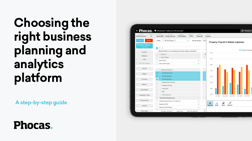Free business analytics software. Is it worth it?

“Free BI trial, business analytics software for free, free BI reporting”– these offers are tempting business people all the time especially as new players enter the market and want cut-through.
To some degree, these pledges are what we like to believe in, even those of us who know better have been tempted to give ‘free’ a go.
We regret to advise that useful business intelligence software isn’t free - especially if you want high user adoption, and you want compatibility with an organisation’s ERP system, and you want to address industry specific challenges. Worse than that, companies who think free might work for now are always paying – with their money and their human resources.
The free path is fraught with obstacles such as data limits, refresh limits, a restricted number of queries, compromised security, no drill through, no prebuilt content and the need for an expert to build any report. The cost of alleviating these problems can add up – expect $5000 per month, and that won’t resolve everything.
But now to the good news. Subscription-based, cloud data analytics software providers offering industry-specific data solutions exist and have been honing their industry knowledge for years. Companies like Phocas already know your data pain points and have built its software accordingly. The software can also be used by anyone in the business, not just analysts, IT experts or developers and a starting package with all the in-built queries starts at under $1000 per month.
To ensure you don’t compromise on the business data analytics you choose for your business, team or division, we suggest that you consider these factors when researching different suppliers.
Compatibility with your ERP system
To ensure smooth integration with your existing systems, ask the software vendor what ERPs they are familiar with and have experience integrating with. If your ERP system is one they know, the integration should be smooth and timely. If they haven’t worked with your ERP system, then you can expect extra costs for configuration and implementation delays.
Specific pre-built content for immediate results
Ask the data analytics supplier what industries they work with and whether the software comes with any pre-built content like dashboards, scorecards or metrics created specifically for sales teams, executives and procurement managers.
With the rise of cloud platforms, you will be pleasantly surprised by the number of data analytics tools that have been explicitly developed for key industries. Take, for example, Phocas data analytics that have been created for manufacturers and retailers, and with pre-built content to measure key metrics for product-centric businesses. These businesses need to deal with declining customers, have an accurate stock level and be able to identify unwanted stock, so Phocas software comes with in-built queries to address all of these pain points and opportunities.
The extra benefit of in-built queries is to reassure new users of the software that they can get results, and when people see straight way that the software is user-friendly, they will be more likely to use it.
Ongoing training and support
It is common when you buy software that the vendor provides training upon implementation, but once the on-boarding is over, the customer service representative is often not there anymore. Do you want to be alone in a highly technical world?
You need to enquire as to what support is available and its cost. A free customer hotline and access to online tutorials is a good start and a dedicated customer success manager is better. For some software vendors, with a strong customer following and strong retention, they often organise regular user groups. These events provide access to a range of experts in the company and allow people to meet other users and discuss similar experiences.
Grows with your organisation
Businesses are always changing so choosing a BI platform that can cater for future growth and needs is key. It’s important to review the options for flexibility and understand whether the solution can scale to meet the growing volumes of data you produce across your organisation. Can it adapt to your financial reporting and infrastructure needs?
And don't forget to ask that critical question of your data analytics supplier "How often is your solution updated and when can I get access to all the additional changes?”

Empowering businesses with intuitive data analytics, driving informed decisions for growth and profitability. We make people feel good about data.

Essential KPIs every distribution company executive should measure
For mid-market leaders running a wholesale distribution business, data and business intelligence technology are crucial for monitoring financial and operational performance. However, the real value lies in how your team uses the data insights to influence decision-making.
Read more
5 key FP&A trends for 2025
The role of the CFO is evolving rapidly, extending beyond traditional financial stewardship to encompass business partnering, operational oversight and technological innovation. A 2024 Sage study of over 1,200 global finance leaders reinforces this transformation:
Read more
The wide appeal of self-service reporting
Your own data is a critical asset that can drive business growth, improve decision-making, and boost customer satisfaction. Among the various tools available, self-service reporting solves one of the most significant barriers to real-time data analysis—accessibility.
Read more
How to prepare professional board reports
Preparing effective board reports cannot be underestimated. They’re not only essential for communicating financial performance and operational progress, but are also an all-important part of strategic and intelligent decision-making.
Read more
Find out how our platform gives you the visibility you need to get more done.
Get your demo today